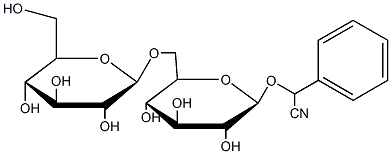| Product Name: | Amygdalin | |
| Product Type: | Main Products | ||
| Usage: | Antitumor | ||
| Clicks: | 8806 | ||
| Release Time: | 2010-03-02 | ||
| Introduction | |||
Chemical name: Benzeneacetonitrile,α-(6-O-β-D-glucopyranosyl-β-D-glucopyranosyl)oxy:-, (R)- Structure :
Solubility parameter :83G/L(25°C) Melting point: 223-226°C English_Synonyms: Toxicity The metabolism of amygdalin produces hydrogen cyanide, a potent toxin. Beta-glucosidase, one of the enzymes that catalyzes the release of cyanide from amygdalin, is present in the human small intestine and in a variety of common foods. This leads to an unpredictable and potentially lethal toxicity when amygdalin or laetrile is taken orally. Ingestion of purified amygdalin or apricot seeds can cause severe toxicity and death due to cyanide poisoning. Numerous case reports in medical literature describe serious cyanide poisoning in patients who ingested laetrile as a cancer treatment. Cancer treatment One hundred seventy-eight patients with cancer were treated with amygdalin plus a "metabolic therapy" program consisting of diet, enzymes, and vitamins. The great majority of these patients were in good general condition before treatment. None was totally disabled or in preterminal condition. One third had not received any previous chemotherapy. The pharmaceutical preparations of amygdalin, the dosage, and the schedule were representative of past and present Laetrile practice. No substantive benefit was observed in terms of cure, improvement or stabilization of cancer, improvement of symptoms related to cancer, or extension of life span. The hazards of amygdalin therapy were evidenced in several patients by symptoms of cyanide toxicity or by blood cyanide levels approaching the lethal range. Patients exposed to this agent should be instructed about the danger of cyanide poisoning, and their blood cyanide levels should be carefully monitored. Amygdalin is a toxic drug that is not effective as a cancer treatment.Amygdalin on atherosclerosis Regulatory T cells (Tregs) play a critical role in the regulation of T cell-mediated immune responses in atherosclerosis, a chronic autoimmune-like disease. Therefore, in this study, we aimed to investigate the therapeutic effect of amygdalin on atherosclerosis of apolipoprotein E deficient (ApoE−/−) mice, and to explore its immune regulatory function by stimulation of Tregs. How is Amygdalin administered? Amygdalin is given by mouth (orally) as a pill. It can also be given by injection into a vein (intravenously) or muscle. Laetrile is commonly given intravenously over a period of time and then orally as maintenance therapy (treatment given to help extend the benefit of previous therapy). is given by mouth (orally) as a pill. It can also be given by injection into a vein (intravenously) or muscle. Amygdalin is commonly given intravenously over a period of time and then orally as maintenance therapy (treatment given to help extend the benefit of previous therapy). The side effects of Amygdalin treatment are like the symptoms of cyanide poisoning. These symptoms include: Nausea and vomiting; Headache.Dizziness; Blue color of the skin due to a lack of oxygen in the blood; Liver damage; Abnormally low blood pressure; Droopy upper eyelid; Trouble walking due to damaged nerves; Fever;Mental confusion;Coma.Death. | |||







 Amygdalin
Amygdalin 
